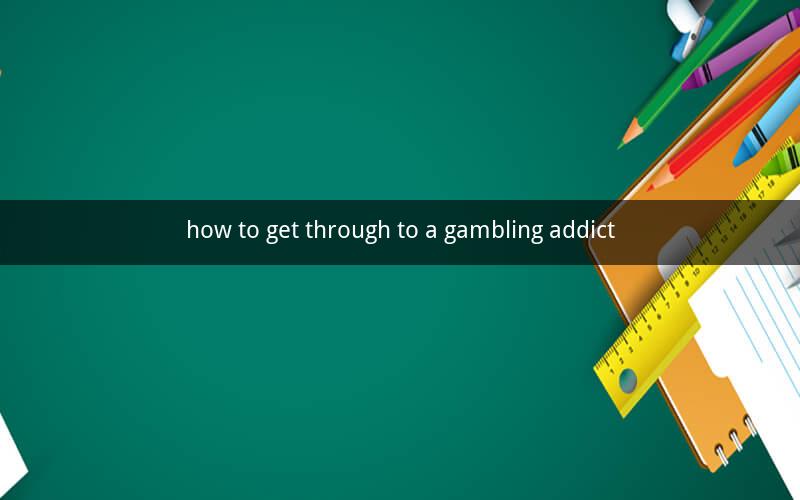
How to Get Through to a Gambling Addict
Table of Contents
1. Understanding the Problem
2. The Importance of Education
3. Building Trust and Communication
4. Encouraging Professional Help
5. Supporting the Addict in Their Recovery
6. Setting Boundaries and Expectations
7. Coping with Relapse
8. The Role of Family and Friends
9. Legal and Financial Consequences
10. Long-Term Support and Aftercare
1. Understanding the Problem
To effectively communicate with a gambling addict, it is crucial to first understand the nature of the addiction. Gambling addiction is a complex disorder characterized by an inability to control the urge to gamble, despite the negative consequences. It often affects not only the individual but also their family and friends.
2. The Importance of Education
Educating yourself and the addict about gambling addiction can help in building a foundation for recovery. Learn about the signs and symptoms of addiction, the psychological and emotional aspects, and the potential health risks. This knowledge can empower you to approach the situation with empathy and informed support.
3. Building Trust and Communication
Establishing trust is essential in any relationship, especially when dealing with a gambling addict. Open and honest communication is key. Listen actively, without judgment or lectures, and express your concerns and feelings clearly. Avoid confrontational language and try to maintain a calm demeanor.
4. Encouraging Professional Help
Encourage the addict to seek professional help from a therapist or counselor specializing in gambling addiction. Therapy can provide a safe space for the individual to explore their addiction, understand its root causes, and develop strategies for recovery.
5. Supporting the Addict in Their Recovery
Support the addict in their recovery journey by being present and available. Attend therapy sessions with them if they are comfortable with it, and offer to help with practical tasks that may have become overwhelming due to their addiction. Celebrate small victories and milestones along the way.
6. Setting Boundaries and Expectations
Set clear boundaries and expectations to protect yourself and the addict. This may include limiting contact with gambling-related activities, establishing financial boundaries, and ensuring the addict has a safe and supportive environment to recover in.
7. Coping with Relapse
Relapse is a common part of the recovery process. If the addict relapses, remain supportive and focus on the overall progress rather than the setback. Encourage them to learn from the experience and continue seeking help.
8. The Role of Family and Friends
Family and friends play a vital role in supporting the gambling addict. Attend support groups such as Gamblers Anonymous, educate yourself on addiction, and offer your support to the addict and other family members. Remember to take care of your own well-being as well.
9. Legal and Financial Consequences
Gambling addiction can lead to significant legal and financial consequences. Educate yourself on the potential legal issues and help the addict understand the financial impact of their addiction. Encourage them to seek legal advice and work on repairing any damaged relationships or financial situations.
10. Long-Term Support and Aftercare
Recovery is a lifelong process, and long-term support is essential. Encourage the addict to continue attending therapy sessions, support groups, and self-help programs. Stay involved in their recovery journey and offer your ongoing support.
---
Frequently Asked Questions
1. How can I tell if someone is a gambling addict?
A gambling addict may exhibit signs such as secretive behavior, increased financial stress, neglecting responsibilities, and spending excessive time and money on gambling.
2. Can gambling addiction be cured?
While there is no guaranteed cure for gambling addiction, it can be effectively managed through treatment and support.
3. How can I help a gambling addict without enabling their behavior?
Set clear boundaries, offer support without taking over, and encourage the addict to seek professional help.
4. Is it normal for a gambling addict to relapse?
Yes, relapse is a common part of the recovery process. It is important to remain supportive and help the addict learn from the experience.
5. Can therapy help a gambling addict?
Yes, therapy, particularly specialized treatment for gambling addiction, can be highly effective in helping individuals manage their addiction and develop healthier coping mechanisms.
6. How can I support a family member who is a gambling addict?
Attend support groups, educate yourself on addiction, offer emotional support, and help with practical tasks.
7. What are the legal consequences of gambling addiction?
Legal consequences can vary depending on the jurisdiction and the severity of the addiction. They may include fines, probation, or even jail time.
8. How can I help a gambling addict repair their financial situation?
Encourage the addict to seek financial counseling, help them create a budget, and offer support in rebuilding their credit and finances.
9. Can a gambling addict recover without professional help?
While some individuals may recover without professional help, it is often more challenging and the risk of relapse is higher without proper support and treatment.
10. How can I maintain my own well-being while supporting a gambling addict?
It is important to take care of yourself by seeking support, setting boundaries, and engaging in self-care activities. Remember that your well-being is just as important as the addict's.